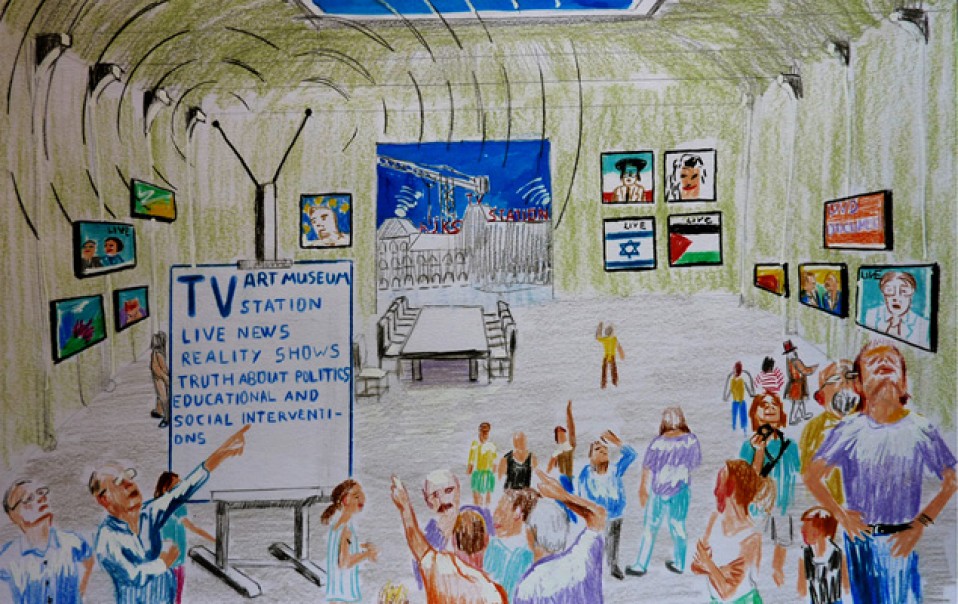
Opening hours
Wed- Fri 1-5pm, Sat 11am-3pm
Closed 24/25/31 Dec 2010 and 01Jan 2011
Museum TV Station
Lado Darakhvelidze
Ends 08 January 2011
Live broadcasts: performances, readings, manifestos
6.00pm Introduction of Museum TV Station
6.15pm Irakli Kakabadze (New York)- performance commenting on WikiLeack
6.30pm Jimini Hignett (Amsterdam)- ‘How To Go on Making Art When Everything Is All Fucked Up’
6.45pm Zurab Rtveliashvili (Stockholm) – Shark; MISSION №
7.15pm Pamela Renner (New York) – Poem for a State of National Emergency
7.30pm Ideal News Paper
Friday, 10 December, 4 - 6 pm
Open call: Citizen Journalism
Make a 5 minute citizen report on issues you think are urgent by SKYPE [skypename: vladimer[darakhvelidze]
The Georgian artist Lado Darakhvelidze deals in his work with social and political changes and represents these in personal narratives. In his previous work, he reflected the ‘transitions’ and re-placements of national symbols in post-communist countries in a subtle and poetic way, which expands the political and opens it to mythology, history and storytelling.
For PS², he will investigate the current situation of media- and art organizations in Northern Ireland and build his vision of an all in one center for news, images, imaginations and entertainment.
International satellite stations to artists, cultural activists, poets and art institutions will be established during the duration of the project via skypelinks.

Peformance and skype sessions
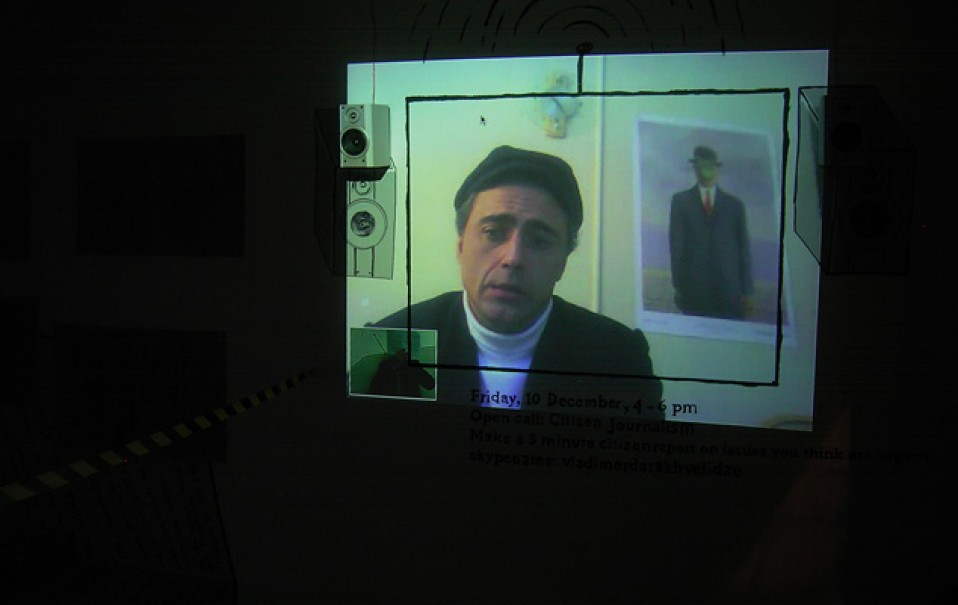
Skype session
Live broadcasts- Biographies
Jimini Hignett is a multi-talented visual artist and writer. Born in England, she grew up in Scotland, and has lived in London, New York, Moscow and Havana before settling in Amsterdam.
Jimini is predominantly self-taught, and has worked extensively in the arts – performing, set-designing, film-making – and her scenario ‘The Portrait of Natasha’, was awarded first prize at the International Documentary festival in Amsterdam.
The umbrella theme under which she works is: ‘How To Go On Making Art When Everything Is All Fucked Up’. Her work often deals with the dilemmas of being an artist amidst the world’s complacencies and complexities, and she has come to the conclusion that in the current disastrous, global political situation, in order for art to be valid it needs to be radical, activist, co-operative and passionate.
Her recent publication ‘The Detroit Diary’ includes a text by French sociologist Loïc Wacquant on who provided a text on urban desolation, ethnoracial domination, the penalization of poverty, and the ‘first society of advanced insecurity’.
Before finding her calling as an artist, Jimini worked at various other jobs, including court-jester, translator, saxophone repairer, roller-skating waitress, plumber and performer, filmmaker and mother.
Zurab Rtveliashvili (born 1967 in Karaganda, Kazakhstan) is a Georgian poet and multi-media performer.
In 2010, Zurab Rtveliashvili was offered asylum in Stockholm, Sweden from persecution in his native Georgia with the help of International writers' association PEN.
International PEN fights for freedom of expression and acts as a powerful voice on behalf of writers harassed, imprisoned and sometimes killed for their views. It is the world’s oldest human rights organization and international literary organization.
Pamela Renner is a writer and cultural journalist from New York City. As a Fulbright Scholar, she lived in Tbilisi, Georgia from 2007-2009. A critic and arts reporter, Pamela has contributed to national public radio, American Theatre magazine, The New Yorker and Eurasianet.org. In addition, she has taught college writing and journalism in New York and in Tbilisi. She is proud to participate in MTVS.
Irakli Kakabadze is a Georgian writer, performance artist, peace and human rights activist. Kakabadze was recently awarded Oxfam/Novib Pen Freedom of Expression Prize. Irakli Kakabadze's articles and stories have been published in Georgian, Russian and English newspapers and magazines. In September 2005, he suffered a concussion at the hands of unidentified attackers, likely a result of the views he has peacefully expressed. He was arrested four times in 2006 and held for 30 days in July in relation to public expression of his views. In 2007, he received Lilian Hellman/Hammet grant from Human Rights Watch which aim to help writers confront and survive persecution. From 2008, Kakabadze is hosted as a Writer-in-Residence in the city of Ithaca, NY, US and teaches at Cornell University. He is the author of Polyphonic Blues which is multi-lingual and multi-narrative performing style. Irakli Kakabadze's work is subject of a verite documentary ‘At the Top of My Voice’.
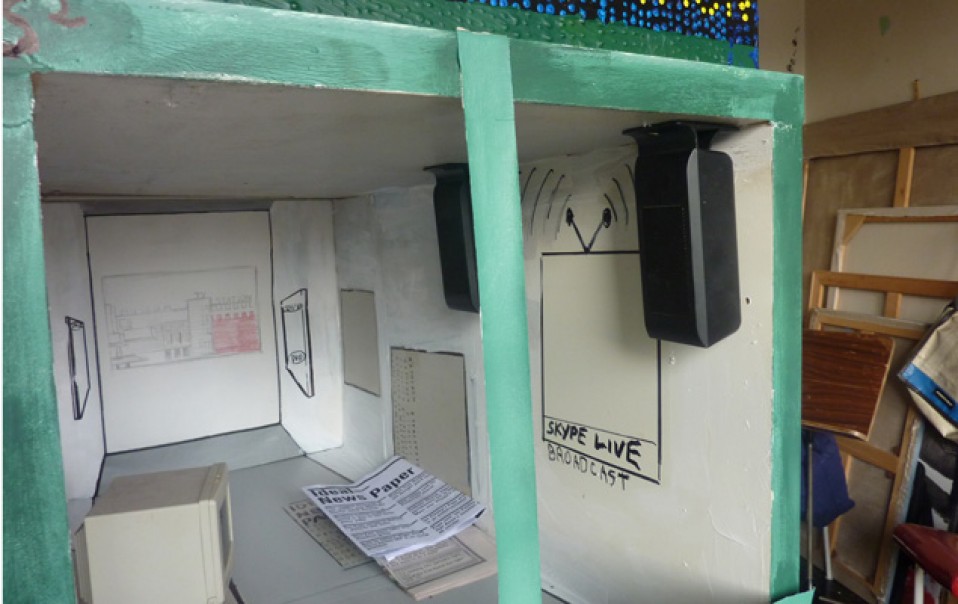
Model
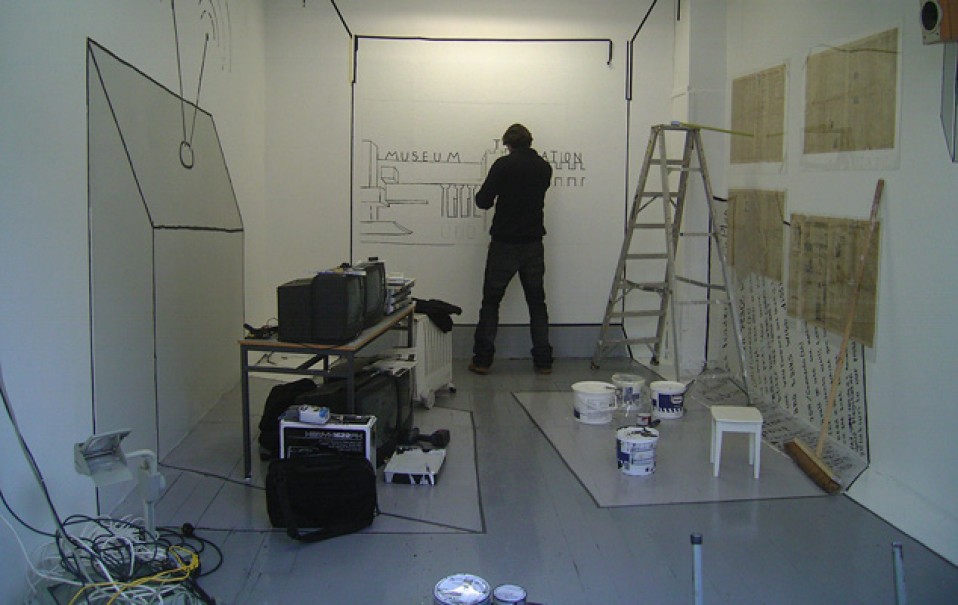
Install
Charlie Fox/ Andrew Cooper: Communist Gallery TV: a space for imagined alternatives
The Communist Gallery promises a space, and a situation, for imagined alternatives: a collective space that reconnects notions of common action and artistic subjectivity. It is an ideal space, in which to create: difference without fear, the being together but apart, and hobbyhorses for the future. A space to think fantastically: without prejudice, without limit, carefully and precisely, to confront the limits of artistic capacity and always ask for more.
It offers a space to break back into the fantastic, and break out of our unconnected, individualistic subjectivity, towards other visions, to an alternative reality. This requires a certain dissolving of the subject self. The Gallery as collective action seeks to occupy, in a territorial sense, a space creating a discourse, involving revolt, risk taking and a questioning of the prevailing notions of logic and universality; allowing for the frictions, disagreements, confusion in taste, ‘the shock of the unintelligible’ (Adorno 1980: 180) in encounters with one another, that offer a return.
It is imperative, now, to insist on what artistic practice can allow: what it can open, while resisting the urge to commodify and quantify. This is an artistic space where we can truly think something different. The more extreme the political and economic climate, the more important it is to practice and un-ashamedly defend this art space, the psychic space of dreams that ferment change. For what is really up for question is how the potential vitality of this space has been hijacked, how the forces of capital have limited what this free space can offer society.
Charlie Fox is an artist and writer based in London, working since 2000 as the artistic director of counterproductions. counterproductions seek to promote socially engaged and experimental artistic practices: producing and collaborating on education, community and transdisciplinary art projects.Recent projects include Shibboleth the Show (Dilston Grove 2006/7) Pavilion (Art Caucasus, Georgia 2007), Urban Bear Research Centre (Portman Gallery, Space Station Sixty-Five) and Smile More, Laugh now, Cry Less (Consume Peckham /I Love Peckham 2008, Beirut and Istanbul), Bun…sh… shh… House (MobileConference 2009, Peckham Space), and The Communist Gallery (London 2010). Charlie has recently completed 'In the Event of Laughter’, a practice-as-research PhD, recuperating the political and social agency of artistic laughter.
Andrew Cooper is an artist, curator and teacher. He is interested in the language and hierarchy that create the social dimension of art. Past projects include The Muttering Cavern of Domestic Delights at Five Years Gallery and Rabbles Furious Struggle and Performances. He also started the Communist Gallery in collaboration with other artists, and initiated the Portman Gallery with Dean Kenning, a contemporary art gallery, which exists within the grounds of a state secondary school in London. He also has 19 years experience of working part time at Morpeth School as an art teacher.
Pamela Renner : Poem for a State of National Emergency
As we watch, two men on the balcony cut down
every banner hanging from the Opera House.
Only a fat Spanish soprano survives
the state of emergency ban.
Oh but maybe she’ll sing Wagner now?
Around the corner a khaki truck
hands out fifty cold cokes
to fifty men in camouflage.
At the centre of Tbilisi—
wheezing silence, an older fear
unpacked from its suitcase, its camphor.
One more young revolution betrayed
in a small country far away.
On the southern rim of the former USSR,
Lermontov, Tolstoy, and Mandelshtam came
to taste peaches, wine, and dark-eyed girls,
to see the young men leap on their toes,
and fly: spirit warriors of the wood.
Two months ago, I was new to town.
The hills smelled of pine needles.
Caucasus peaks scraped the stars raw.
Summer seemed endless.
ii)
During the days leading up to
The Rose Revolution, four years before,
Nino left her nursing son,
to join the crowds of people marching
in front of Parliament,
massing peacefully
to oust a corrupt president,
and build a new government.
“Today my country needs me.”
His grandmother took the child in her arms.
In the street, students held roses.
Nino, returning after dark—
milk streaking down her shirt—
sat with her child,
her eyes tender and wild.
ii)
Four years passed.
The cycle spun,
Streets filled again with protests,
Then riot police, a futile, weary violence.
Who could know the deadness
of those days afterwards,
when the television news goes dark,
the radio sputters out?
And when the paramilitary men have gone
wherever bogeymen go;
Rustaveli Prospekt
is inhumanly slow.
Lado and I walk past the rows of regular Georgian troops
forming in mid-day processions.
In a vacant café off Freedom Square
(formerly Lenin square)
We talk of Pirosmani’s work.
“As a Georgian child in Soviet times,”
Lado says, “Pirosmani existed,
so I wanted to paint.”
Because we are all fated to imitate
our worst models; because it is difficult
to make a new state from the wreckage of the old;
because democracy is a child of passion,
(easily abandoned by its father
when it starts to teeth and wail)
we talk of art, the paradox of fragile things
that cannot be broken by blows.
Tbilisi, Georgia
November 8th, 2007
Zurab Rtveliashvili
MISSION №
Crucified airplane
Crucified in the sky
It has the soul of men.
The machinegun has bullets instead of words
Up in the sky the anonymous pilot has a cruel smile
In the morning when it is flying on the bald head of the city…
Crucified airplane
Crucified in the sky
It has the will of men.
It’s turning off the city lights
By its strange praying
From right to left it is combing like an old barber
Corrupted governments are amazed by their own failure
Crucified airplane
Crucified in the sky
It has the will of men.
The machinegun has bullets instead of words
It will cough hot bombs like cotton balls
And when the mission is accomplished
Will disappear in the sky.....
Shark
When Culture is dozing off
poetry is collapsing.
I am making sounds from my throat like a singingsaw with glowing hot needles instead of a bow.
Singing saw.
This voicccccccce changes all rules around.
Timbrrrrrrrrrrrrrrrrre.
Slowly bending the sword in my throat, poetry surrenders with screaming sounds.
Culture is an Ocean.
A shark at the bottom of the ocean is dozing off
(Dozing off)
(Dozing off)
(Dozing off)
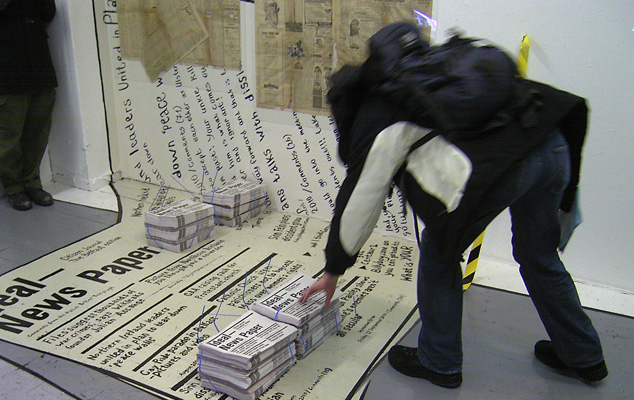
Free newspaper
Lado Darakhvelidze writes about the project
'Museum TV Station' (MTVS) refers to art activities in museums, biennials and related art events, in which the artwork and curatorial events evoke actual political and engaged positions and where both the artist and curator transform the museum or venue into what might be termed an open source informationstation centre.
By realizing Museum TV Station in different cultural settings, it acts as an alternative to conventional information stations. MTVS in PS² will broadcast a fusion of art & citizen-journalism, using live broadcast and lecture performances and will create its own information field in a 3-D space.'
As part of the 'Museum TV Station' project, Lado Darakhvelidze researched the online comments of the Belfast Telegraph newspaper over the past months and collected these 'voices and views from the public' .
A selection of comments and private opinions, made online on the Belfast Telegraph website as a reaction to articles and topics in the newspaper, are transferred into print in the Citizen Journal, Series # 3.
Lado Darakhvelidze's Ideal News Paper does not represent the 'official' news, but the views of a wide public. It can be seen as a reinstatement of citizenship and a form of direct democracy. It also serves as barometer about social and political interests, tendencies, prejudices and views of people in Northern Ireland.
Colophon
'The Internet is a forest of information. There is an infinite number of sources such as video channels, digital journals, online newspapers and social networks. How does one make sense of it all? The project Citizen Journal integrates commentary from online newspapers articles into a self-published newspaper.
By assembling these comments back into a printed newspaper, Citizen Journal manifests them permanently and transforms their anonymous authors into ‘citizen journalists’.
Text: Lado Darakhvelidze
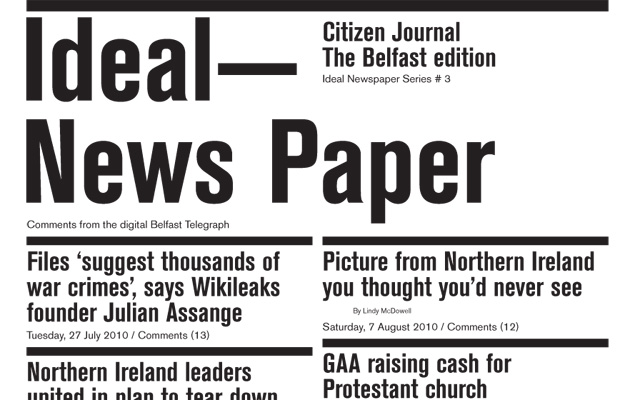
The first issue of Citizen Journal was published in an edition of 100 on the occasion of ‘Manifesta 8’ the European Biennial of Contemporary Art, Murcia, Spain.
The second issue of Citizen Journal was published in an edition of 300 on the occasion of ‘The State of Artez’, Arnhem, The Netherlands.
The third issue of Citizen Journal is published in an edition of 500 on the occasion of the exhibition ‘Museum TV Station’, PS², Belfast, United Kingdom.
Concept: Lado Darakhvelidze
Design: Aagje Martens
Guest editors: Jimini Hignett, Rosell Heijmen
Printing: Newspaper Club
'Museum TV Station' is the first in the series: imaging// re-imaging. They are creative investigations into the changing identities of communities and public institutions in Northern Ireland.
Many Thanks to Colm Clarke for the technical assistance.

